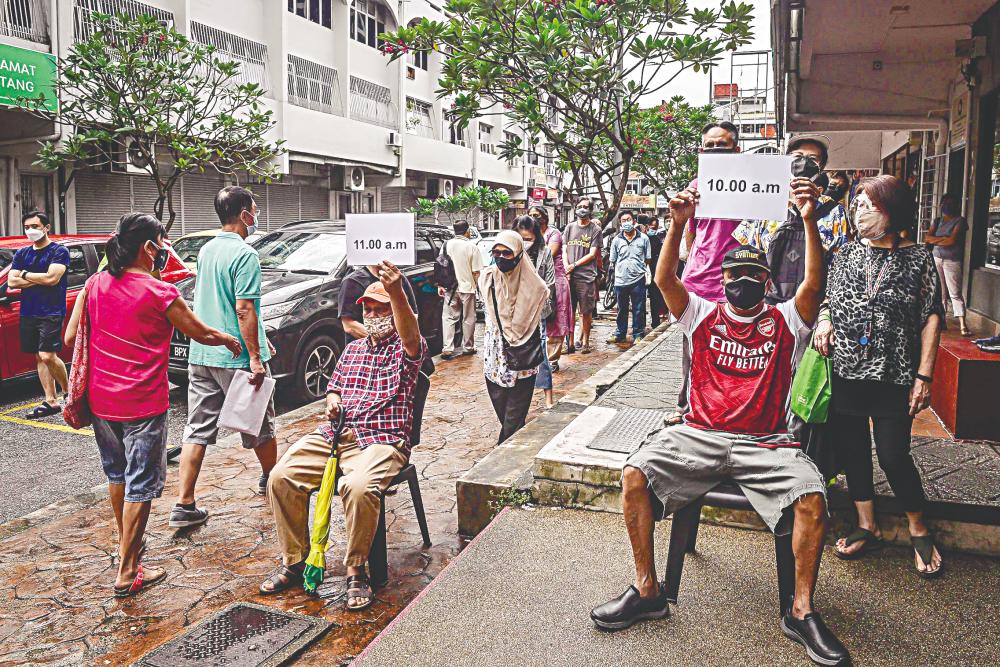PETALING JAYA: In the face of a surge in Omicron cases, health experts have recommended regular self-testing and greater vigilance instead of increased penalties to stem the tide of Covid-19 infections.
Malaysian Medical Association president Dr Koh Kar Chai said if health authorities are notified when a self-test turns up positive for Covid-19 infection, a health professional could be assigned to monitor the patient.
He was commenting on a recent caution by Health Minister Khairy Jamaluddin for Malaysians to be prepared for a huge wave of Omicron infections.
The Omicron variant is said to be less severe than its predecessor Delta, but it is more virulent. Khairy said if there is a surge in infections, healthcare facilities, particularly intensive care units, could come under extreme pressure.
Koh said self-testing could help to identify positive cases early.
“They can then be quickly isolated to prevent further spread, in line with the World Health Organisation’s FTTIS (find, test, trace, isolate and support) strategy.
“Of course, health authorities must also be informed so that a health professional trained in treating Covid-19 patients can assess and monitor the infected person,” he said.
Koh warned that there are limitations to the self-test kits and those in doubt should see a doctor, especially if they show symptoms of Covid infection.
He said while stricter penalties could ensure compliance to a certain extent, education is key in the fight to curb Covid-19.
Universiti Malaya head of social and preventive medicine Dr Victor Hoe pointed out that current restrictions are quite sufficient to curb the spread of the Omicron variant.
“It is not necessary to tighten it further or to increase the penalties to ensure compliance,” he told theSun.
“People just have to be more vigilant and responsible. For instance, they should lodge a complaint if they find that the SOP is not strictly observed at a specific venue or place of work.”
He pointed out that workers have the right to a safe and healthy work environment, as enshrined in the Occupational Safety and Health Act 1994.
“They have the right to refuse to go to work if the SOP is not observed. They should also lodge a report with the authorities if they find that their workplace is unsafe or poses potential health hazards,” he added.
Hoe noted that Malaysians are generally more compliant and the vaccination rate is high and people are more agreeable to getting the booster shot.
He stressed that the booster shot would enhance protection against infection.
“We should not delay getting our booster shots. The earlier the better.
“Of course, we must continue to wear face masks, observe social distancing and religiously sanitise our hands,” he added.
He warned people against letting down their guard.
Hoe expressed confidence that the Health Ministry has taken all the necessary steps to manage a possible surge in infections but only time will tell if that is sufficient.
“The Omicron is highly transmissible, so the focus should be on prevention. Otherwise, the need for hospitalisation will rise and it could overwhelm the healthcare system and result in more fatalities,” he said.
“The idea is to not take chances.
“Many who have been infected didn’t know how or where they picked up the virus.
“It could come from someone you least expect.”
He said the daily tally of new infections could rise in the next few weeks but with continued vigilance, the situation should be under control.
Several steps have been taken to address the problem. For instance, the umrah to Saudi Arabia has been suspended from this Sunday, given that most of the cases in Malaysia were imported.
As of Tuesday, Malaysia had detected 122 cases of Omicron, with 117 of them imported.
Seventy-one involved pilgrims who had just returned from performing the umrah.














